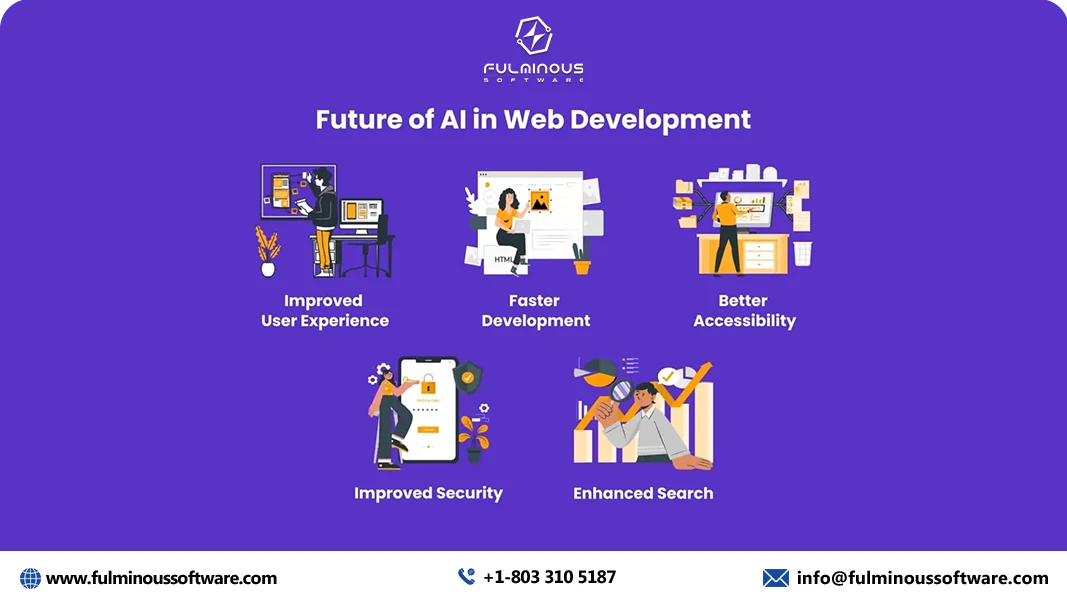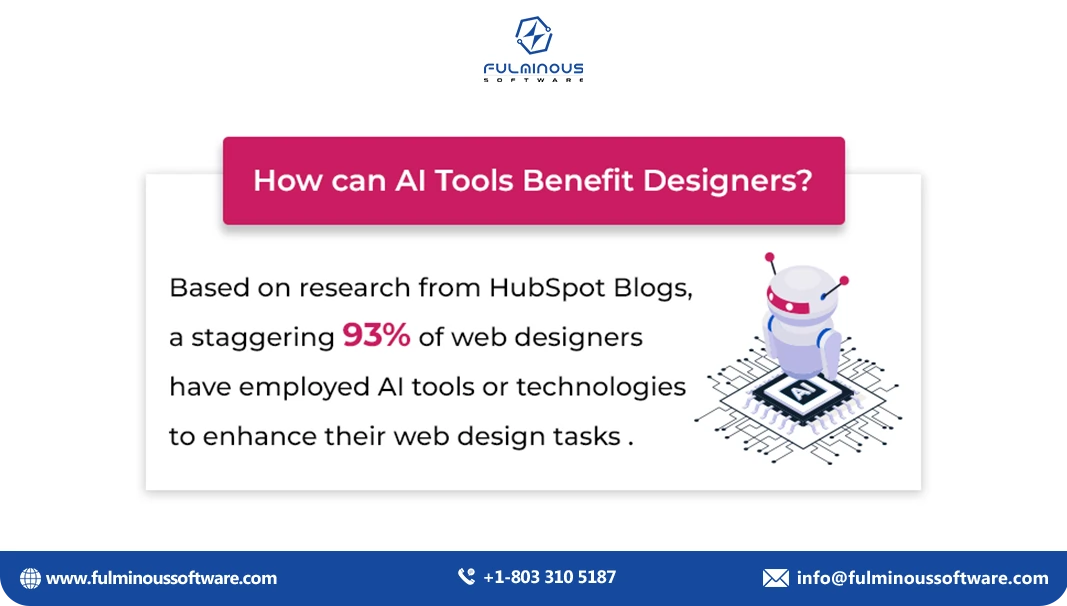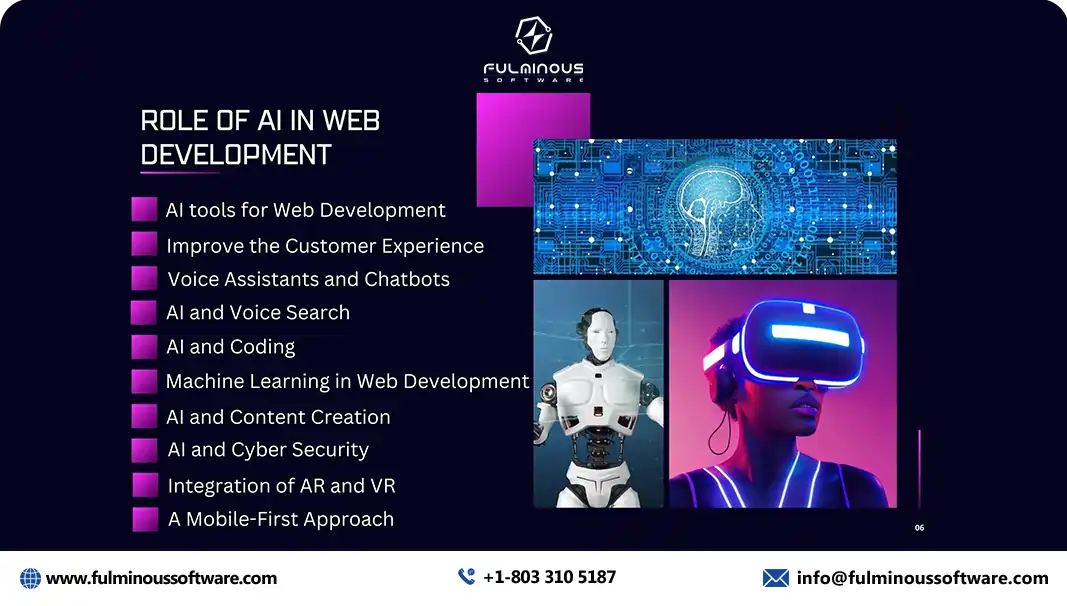How AI Will Transform Web Applications by 2025
Manish Kumawat
Last Updated on: 07 October 2025
Our daily lives are now impacted by artificial intelligence. For instance, have you ever used an OTT streaming service like Netflix or Amazon Prime Video? These OTT platforms use AI to suggest shows and movies based on your watch history. Or perhaps you've shopped online and received personalized product recommendations. AI's impact and significance in our daily lives is only going to increase. Future predictions call for extraordinary transformations.
The quick development of the web application area can be attributed to artificial intelligence (AI). Artificial Intelligence will drastically transform the way we engage with web applications by 2025. We'll look at how AI is influencing web applications going forward and what to anticipate by 2025 in this blog.

It's not a Silly Matter! See this Amazing Stats
- The market for AI is predicted to expand twentyfold by 2030. (source)
- Statistics show that between 2023 and 2030, the AI market is expected to increase at a rate of 37.3% annually. (source)
- HubSpot states that: AI tools are used by 58% of designers for imagery and 50% for web page designs. Using these technologies, 49% of designers verify their strategies. 40% utilize AI tools to assess the quality of the design, 20% use AI to study the user experience, and 43% focus on design optimization.
Yes, it's not a joke, AI is changing the web applications overall. See:

These are only a few data that show the trends. Let's see the upcoming scenarios.
12 Upcoming Trends in AI-powered Web Applications
Here we will see the 12 upcoming trends that are going to transform AI-powered Web Applications.
1. Smarter Chatbots and Virtual Assistants
AI-powered chatbots and virtual assistants have already made an impact on our lives, but by 2025, they are going to become more feature-rich. These AI tools will be able to understand human language better, respond more accurately, and handle more complex tasks.
Natural Language Understanding (NLU):
The natural speech and writing patterns of humans will continue to be processed and understood by AI. This means you’ll have smoother conversations with chatbots, whether you're asking about a product or troubleshooting an issue. For instance, instead of having to follow a rigid script or menu of options, you'll be able to ask questions in your own words and receive relevant answers.
24/7 Assistance:
Virtual assistants will be available around the clock, helping users with everything from answering basic questions to managing schedules. Businesses will rely heavily on these AI-driven assistants to improve customer service. Imagine being able to ask your virtual assistant to schedule a meeting, book a flight, or even order groceries. These tasks, which once required human intervention, will become increasingly automated.
Consider the rise of AI-powered customer service chatbots. Companies like Amazon and Walmart have already deployed these chatbots to handle a wide range of customer inquiries.
As AI technology continues to advance, we can expect to see even more innovative and exciting applications for chatbots and virtual assistants. For example, they may be used to provide personalized education, assist with healthcare, or even offer companionship. The possibilities are endless.
2. Enhanced Personalization
AI will make web applications more personalized than ever before till 2024. Whether you’re shopping online or using a streaming platform, AI will tailor the experience to match your preferences.
Recommendation Engines:
Have you ever noticed how Netflix or Amazon seems to know what you’ll like next? That’s AI at work! By 2025, these recommendation systems will become even more accurate and intuitive, predicting what you want even before you know it. For instance, your favorite streaming service might suggest a new show or movie based on your viewing history, the time of day, and even your mood.
User Behavior Analysis:
AI will study how you use apps, what you like, and what you don’t. It will then personalize everything from product suggestions to the layout of a web page, ensuring you get a seamless, customized experience. For example, an e-commerce website might display products you’ve viewed recently or suggest similar items based on your past purchases.
Consider the way social media platforms like Facebook and Instagram personalize your news feed. These platforms use AI to analyze your interactions with posts, pages, and groups to determine which content is most relevant to you.
As AI technology continues to advance, we can expect to see even more personalized experiences on the web. For example, AI might be used to create personalized news feeds that are tailored to your interests and beliefs. Or, it might be used to design websites that adapt to your device and screen size, ensuring a seamless experience across all platforms.
3. Faster and More Efficient Search Engines
AI will significantly transform how we search for information on the web. Search engines like Google will become smarter, providing more relevant results in less time.
Semantic Search:
AI will enable search engines to understand the meaning behind your queries, not just the keywords. For example, if you search for "best places to eat pizza in New York," the AI will know you’re looking for recommendations and not just random facts about pizza. This means you'll get more targeted and helpful results.
Voice Search:
As more people use voice assistants like Siri and Alexa, AI will improve how web applications handle voice-based searches. By 2025, you’ll be able to find answers quickly just by speaking to your device. Imagine being able to ask your smartphone to find the nearest coffee shop or book a flight without typing a single word.
Consider the way Google has already incorporated AI into its search algorithm. When you search for a query, Google's AI analyzes your search history, location, and other factors to provide more personalized results. For instance, if you frequently search for sports news, Google might prioritize sports-related articles in your search results.
We should anticipate seeing increasingly powerful and innovative search engines. For example, AI might be used to create search engines that can understand and respond to complex queries, such as those involving multiple concepts or relationships. Additionally, AI could be used to develop search engines that can analyze images and videos, making it easier to find information based on visual cues.

4. Improved Security with AI
According to statistics, cybercrime will cost the world $10.5 trillion by 2025. As web applications become more advanced, so do the threats that come with them. AI will play a critical role in making web apps safer for everyone by detecting and stopping security breaches before they happen.
Fraud Detection:
AI algorithms will be able to spot unusual patterns in data that might indicate fraud, like unauthorized access to accounts or suspicious transactions. This will help protect users from online scams and hacking attempts. For instance, AI-powered systems can analyze credit card transactions to identify fraudulent activity, such as unusual spending patterns or unauthorized charges.
Biometric Security:
By 2025, more web applications will use AI to recognize your face, voice, or even fingerprints for authentication. This makes it harder for hackers to gain access to sensitive information, as AI-powered security will constantly be improving. For example, facial recognition technology is already being used to unlock smartphones and secure bank accounts. In the future, this technology will become even more widespread and sophisticated.
Many online banking platforms already use AI to detect fraudulent activity. For instance, if you suddenly start making large purchases from a location that is unusual for you, the bank's AI system might flag this as suspicious and send you a notification.
As AI technology continues to advance, we can expect to see even more innovative and effective security measures. For example, AI might be used to create self-healing security systems that can automatically detect and repair vulnerabilities. Additionally, AI could be used to develop new types of security measures, such as behavioral biometrics, which analyze patterns in your typing or mouse movements to verify your identity.
5. Automation of Routine Tasks
AI will continue to automate routine tasks, making web applications more efficient and user-friendly.
Filling Forms: AI will automatically fill out forms based on the information it already knows about you, saving you time and effort. Imagine filling out online forms with just a few clicks, as AI automatically populates fields with your personal information.
Scheduling: Need to book an appointment or schedule a meeting? AI will take care of that for you, finding available times and even sending reminders. This will eliminate the hassle of manually searching for appointment slots and coordinating schedules.
Customer Support: Instead of waiting for a human representative, AI chatbots will instantly help with common issues like password resets or order status updates. This will provide faster and more convenient support to users, reducing wait times and improving overall satisfaction.
Many online booking platforms, such as Expedia and Booking.com, already use AI to automate the booking process. When you search for a hotel or flight, the AI will automatically suggest options based on your preferences, pricing, and availability. Additionally, AI-powered chatbots can help with common customer inquiries, such as checking flight status or making changes to a reservation.
As AI technology continues to advance, we can expect to see even more routine tasks automated. For example, AI might be used to automatically generate personalized email campaigns, manage social media accounts, or even write simple articles.
6. AI-Driven Web Design and Development
AI will revolutionize how websites and web applications are designed and built. By 2025, web developers will rely more on AI tools to create sites that are functional, user-friendly, and visually appealing. Fulminous software is one of the best AI-driven website development and web design services.
Automated Design: AI-powered design tools will allow businesses to create professional-looking websites with minimal effort. These tools will analyze user preferences and automatically adjust layouts, fonts, and colors to improve the overall user experience. For instance, an AI-powered website builder might suggest a color palette based on your brand's logo or create a layout that is optimized for mobile devices.
Code Generation: Developers will use AI to write code more efficiently. AI can speed up the coding process and lower the likelihood of errors by assisting in error identification and improved solution suggestions. Developers will be able to concentrate on more difficult projects, like coming up with novel features and enhancing the functionality of websites.
Some website builders already incorporate AI into their platforms. For instance, Wix and Squarespace offer AI-powered design assistants that can suggest layouts, color schemes, and font combinations based on your preferences. Additionally, tools like GitHub Copilot can assist developers by suggesting code snippets and completing lines of code.
As AI technology continues to advance, we can expect to see even more innovative and powerful tools for web design and development. For example, AI might be used to create websites that can adapt to different user preferences and devices or to generate website content based on specific keywords or topics. Additionally, AI could be used to improve website accessibility, making it easier for people with disabilities to use the web.
7. Predictive Analytics
Predictive analytics, one of AI's most powerful capabilities, involves using data to predict future outcomes. By 2025, predictive analytics will become a core feature of web applications, offering valuable insights and driving business growth.
User Behavior Predictions: AI will analyze how people use web applications to predict their future actions. For example, an e-commerce website might predict when a customer is likely to make a purchase and offer a special discount at the right moment.
Business Insights: Web applications will provide businesses with deeper insights into their customers and operations. AI will analyze data to predict trends, helping companies make better decisions and stay ahead of competitors. For instance, a marketing team might use predictive analytics to identify which marketing campaigns are most effective or to forecast future sales trends.
Many online retailers use predictive analytics to personalize the shopping experience for their customers. By analyzing customer data, such as purchase history, browsing behavior, and demographics, retailers can recommend products that are likely to be of interest.
As AI technology continues to advance, we can expect to see even more innovative and powerful applications of predictive analytics. For example, AI might be used to predict customer churn, identify potential security threats, or optimize supply chain operations. The possibilities are endless.
8. AI-Enhanced User Interfaces
By 2025, AI will make web applications easier and more fun to use. Web apps will become super smart, remembering what you like and making your experience better each time.
Adaptive Interfaces: Imagine using an app that remembers if you like dark mode or a certain layout. AI will adjust the web page to fit your style automatically, making it more enjoyable to use. It’s like having a personal assistant that knows your preferences!
Voice and Gesture Control: You won’t always need a mouse or keyboard to control web apps. With AI, you could simply talk to your computer or swipe your hand in the air to move through web pages. Think of it like a magic trick that lets you browse the web without touching anything!
Modern smartphones already use AI for things like unlocking your phone with your face or using voice assistants like Siri to send messages. AI will keep improving these features and make them even smarter.
In the future, AI might even predict what you need before you ask, offering help when you need it. It will also make apps more accessible to people with disabilities, like those who are blind or hard of hearing. The future of how we use the internet is exciting. AI will make web apps easier, more personalized, and available to everyone!
9. Faster Decision-Making for Businesses
AI will help businesses make faster and smarter decisions using web apps. By 2025, companies will rely on AI to manage huge amounts of data in real-time, so they can respond quickly to market changes.
Real-Time Analytics: AI will provide instant information about how a business is doing. For example, if sales start dropping, AI can alert the business and suggest ways to fix the problem. This helps businesses avoid mistakes and make smart, quick decisions.
Automated Reporting: Instead of spending time gathering data from different places, AI will automatically pull up-to-date information. This saves businesses time and lets them focus on planning and making important decisions.
Many businesses, especially in retail, already use AI to see what products are popular and which ones aren’t selling well. This helps them adjust their inventory, set the right prices, and improve their advertising strategies. In the future, AI will do even more, like predicting trends, spotting risks, and making business processes better. Companies that use AI will stay ahead of their competition and grow faster.
10. AI and Augmented Reality (AR)
By 2025, AI will make augmented reality (AR) more fun and useful in web apps. AR lets you see digital objects in the real world using your phone’s camera, and AI will make these experiences more realistic and helpful.
Interactive Shopping: Imagine holding up your phone to see how a new sofa would look in your living room or how makeup would look on your face. AI will make AR experiences like these smoother and more accurate, helping you make better choices when shopping online.
Learning and Training: AI-powered AR will also change how we learn. Imagine students practicing surgery on virtual patients or employees learning new skills in a virtual environment. AI will guide them through the process, making learning more interactive and fun.
Some companies, like IKEA, already let you use AR to see how furniture would fit in your home. Educational apps also use AR to let students explore historical sites or study virtual animals without leaving their homes.
In the future, AI will personalize AR experiences to your preferences, making it even more fun and practical. AR could also create new ways for people to interact and collaborate in virtual spaces, like hanging out with friends in a virtual room. AI and AR will continue to change how we shop, learn, and interact, making web apps more exciting and immersive!
11. AI-Powered Content Creation
By 2025, AI will make creating content like blogs, social media posts, and videos much easier and faster. AI will help writers and content creators get their work done in less time, giving them more space to focus on creativity.
Content Generation: AI will be like a smart assistant for writers. It can suggest topics, help plan articles, and even write entire drafts based on what the user wants. For example, if you’re writing a blog, AI can suggest topics that are trending or popular, helping you create content that people will love.
SEO Optimization: AI tools will automatically improve content so that it ranks better in search engines like Google. AI can find the right keywords, write descriptions, and suggest ways to make your content easier to find online. This will help your blog posts and websites reach more people.
Some AI tools, like Jasper.ai, can already write blog posts or social media captions from just a simple prompt. Platforms like WordPress also have AI plugins that help with content optimization for search engines.
In the future, AI will be even better at creating content. It might suggest personalized content for readers or even generate videos from a text description. AI will also help improve the quality of writing by finding and fixing errors. It will save time, give useful insights, and help content creators make better content faster.
12. Improved Accessibility
By 2025, AI will make web apps more accessible to everyone, including people with disabilities. AI will ensure that no matter who you are or what challenges you face, you can use the web with ease.
Voice Navigation: AI will allow users with visual impairments to control websites using their voice. For example, they could say things like “read this page” or “go to the next section” instead of using a mouse or keyboard.
Real-Time Captioning: AI will automatically create captions for videos and audio content, helping people with hearing impairments follow along. This will make it easier for everyone to enjoy online videos, shows, and even learning content.
Today, many apps already use AI for captioning. For example, you can turn on captions on platforms like YouTube with just one click, making it more accessible for those who can’t hear well. Some websites also use voice navigation tools, like screen readers, which read the text on a page out loud.
In the future, AI will make web apps even more inclusive. AI could create custom settings for individual users, making apps easier to use for their specific needs. AI could also power new assistive techs like braille displays that work through voice or eye movements.
By making web apps more accessible, businesses will be able to serve a broader audience, and AI will be key in making that happen.
Collaborate with Fulminous Software: Your AI Partner
As a top Artificial Intelligence Development Services Company, Fulminous Software is ready to use AI to boost your company’s revenue if you're wondering how to take advantage of these emerging trends and maximize your earnings. Our team of artificial intelligence specialists enjoys simplifying difficult issues.

Are you interested in finding out more about how AI can change your company with AI applications? Please contact us by call, website, or email.
FAQs
- Q1: How will AI improve chatbots by 2025?
- A: AI-powered chatbots will better understand human language, handle complex tasks, and provide 24/7 assistance for faster responses.
- Q2: How will AI enhance personalization in web applications?
- A: AI will analyze user behavior and preferences to offer more tailored experiences, such as product suggestions and customized layouts.
- Q3: How will AI make search engines smarter by 2025?
- A: AI will enable search engines to understand queries' meanings, provide more relevant results, and enhance voice search capabilities.
- Q4: How will AI improve web application security?
- A: AI will detect suspicious activities, improve fraud detection, and enhance biometric security like facial recognition for safer web usage.
- Q5: How will AI automate routine tasks in web apps?
- A: AI will streamline tasks like filling forms, scheduling meetings, and providing instant customer support, saving users time and effort.
- Q6: How will AI revolutionize web design and development?
- A: AI will automate design and coding tasks, helping developers build more user-friendly, adaptive, and visually appealing websites faster.
- Q7: How will predictive analytics in AI benefit web applications?
- A: AI will predict user behavior and business trends, allowing for personalized experiences and better decision-making for companies.
- Q8: How will AI enhance user interfaces by 2025?
- A: AI will create adaptive web interfaces that remember user preferences and introduce voice and gesture controls for easier interactions.
- Q9: How will AI help businesses make faster decisions?
- A: AI will provide real-time analytics and automated reporting, allowing businesses to respond quickly to market changes and opportunities.
- Q10: How will AI improve augmented reality (AR) in web applications?
- A: AI will make AR experiences smoother and more accurate, enhancing online shopping and interactive learning environments.
HIRE A TOP SOFTWARE DEVELOPMENT COMPANY

 Verified
Expert in Software & Web App Engineering
Verified
Expert in Software & Web App Engineering
I am Manish Kumawat, co-founder of Fulminous Software, a top leading customized software design and development company with a global presence in the USA, Australia, UK, and Europe. Over the last 10+ years, I am designing and developing web applications, e-commerce online stores, and software solutions custom tailored according to business industries needs. Being an experienced entrepreneur and research professional my main vision is to enlighten business owners, and worldwide audiences to provide in-depth IT sector knowledge with latest IT trends to grow businesses online.
Partner with Top-Notch Web Application Development Company!
Discuss your Custom Application Requirements on info@fulminoussoftware.com or call us on +1-903 488 7170.
15 Days Risk-Free Trial

